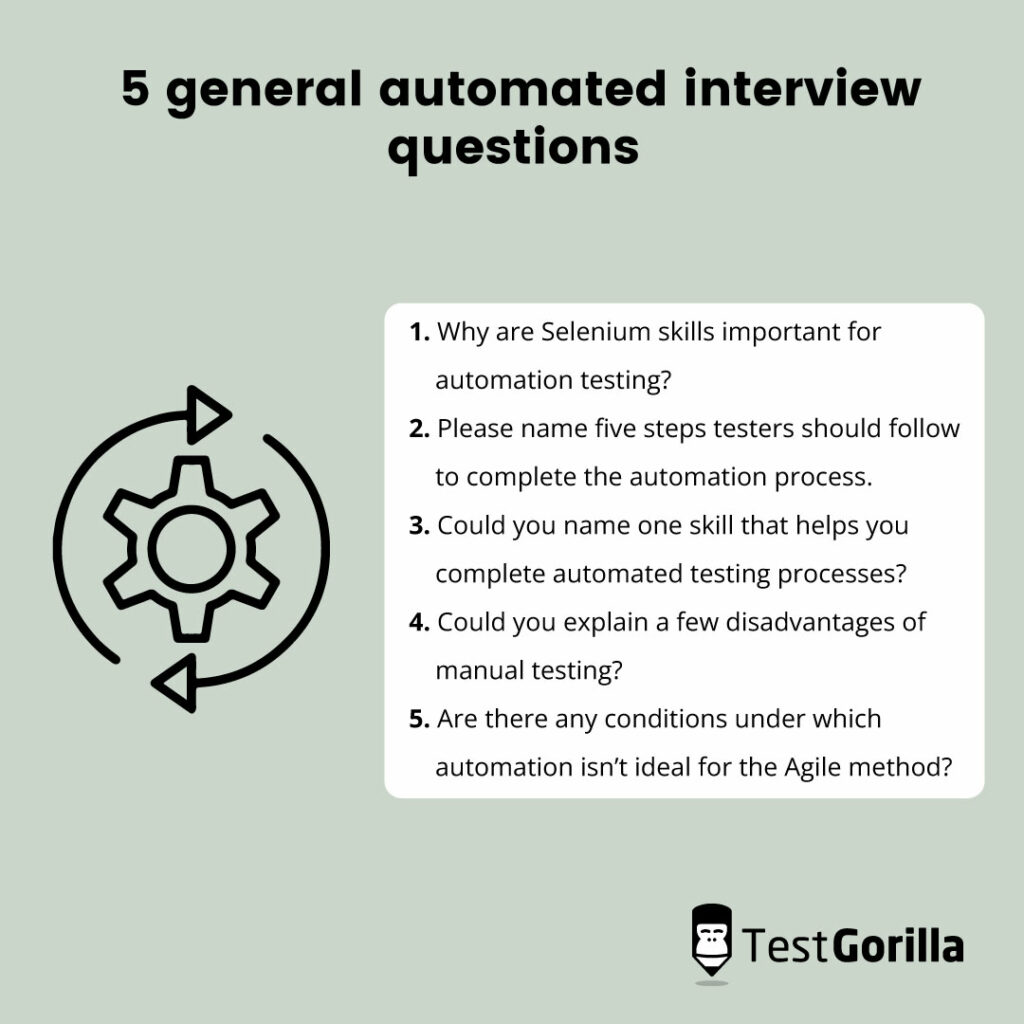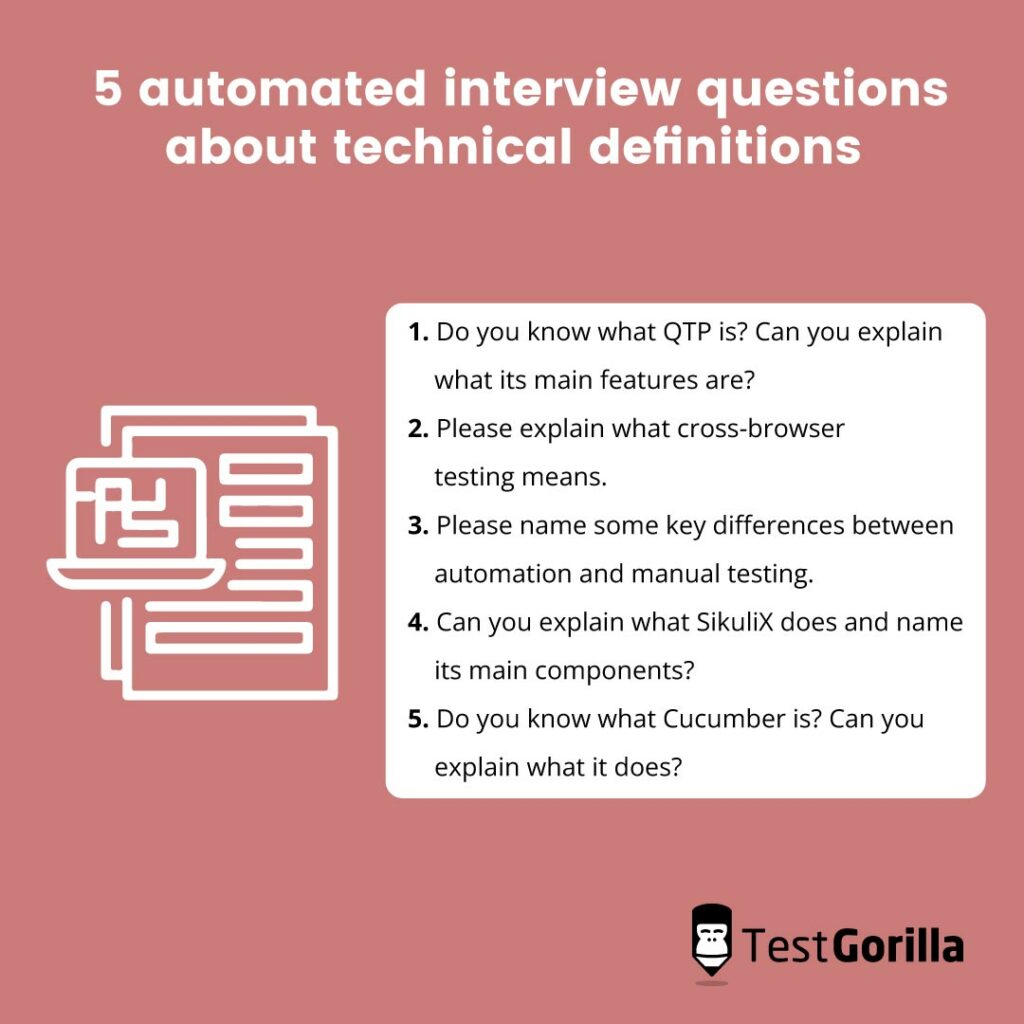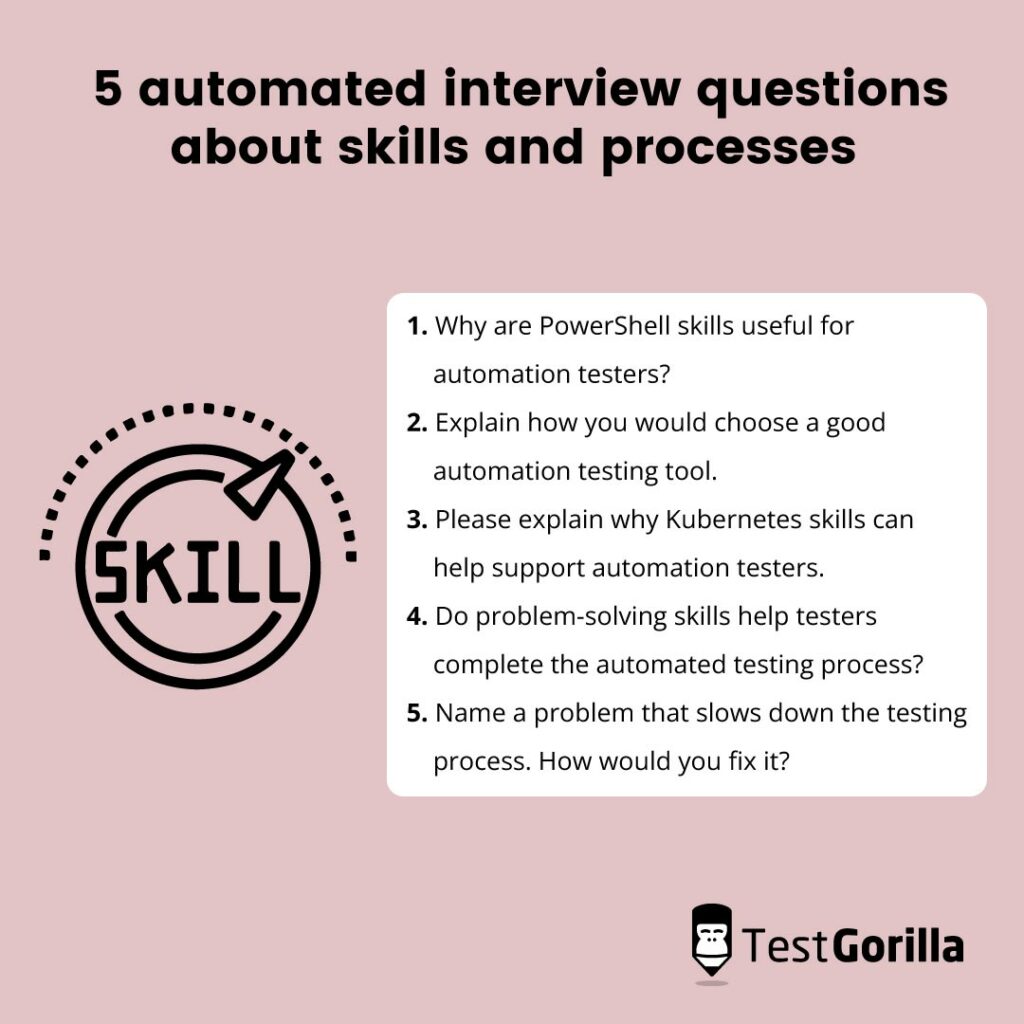50 automated interview questions to ask your candidates
Are you hiring a software tester? It’s crucial to evaluate applicants’ testing knowledge and experience to ensure they are suitable for your team. A skills-testing method that includes a QA/Test Engineer skills test can save you plenty of time during the hiring process, but it’s also vital to interview your applicants.
However, finding suitable questions that dig deeper into your candidates’ expertise isn’t always easy.
If you haven’t found the right automated questions to ask your candidates yet, read this article for 50 automated interview questions to evaluate them.
Table of contents
- 11 general automated interview questions to ask testers
- 5 general automated interview questions and sample answers
- 27 automated interview questions about technical definitions and knowledge
- 5 automated interview questions about technical definitions and sample answers
- 12 automated interview questions about skills and processes
- 5 automated interview questions about skills and processes with sample answers
- When should you use automated interview questions in the hiring process?
- Hire testers with automated interview questions and skills tests
11 general automated interview questions to ask testers
Here are 11 general automated interview questions to ask at the start of an interview to help you learn about your testers’ general experience.
1. Please explain what automation testing means.
2. Can you tell us when you should automate tests?
3. Could you name one skill that helps you complete automated testing processes?
4. Are there any situations in which you shouldn’t automate tests?
5. Please name five steps testers should follow to complete the automation process.
6. Are there any conditions under which automation isn’t ideal for the Agile method?
7. Please tell us some best practices for coding during automation.
8. Why are Selenium skills important for automation testing?
9. Explain whether testers can complete automation processes without frameworks.
10. Could you explain a few disadvantages of manual testing?
11. Which testing tools are best for automation testing?
5 general automated interview questions and sample answers
After interviewing testers, use these five sample answers to some of the most important general automated interview questions to assess their responses.
1. Why are Selenium skills important for automation testing?
Since testers can use Selenium to test web applications in various browsers, Selenium skills are a crucial part of automation testing. This tool contributes to faster releases and repeatable testing so that testers can quickly and easily ship reliable applications.
It’s also easy to write programs in various programming languages with Selenium. It helps developers test applications on several operating systems, such as Windows, Mac OS, and Linux.
Therefore, you should always consider if your applicants have Selenium skills before making a hiring decision. Fortunately, this is easy to do with a Selenium skills test.
2. Please name five steps testers should follow to complete the automation process.
Applicants with automation testing knowledge will understand that several steps can facilitate this process. Here are five steps they should always follow:
Choose the best test tool
Define the required automation scope
Complete design, plan, and development processes
Handle the test execution phase
Maintain the testing process
Skilled testers will understand that automating every test is impossible and that establishing realistic goals is critical for the testing process. Candidates should know both what and what not to automate.
3. Could you name one skill that helps you complete automated testing processes?
Many skills can help testers conduct automated testing. No two answers to this automated interview question will be the same, but the best responses will provide examples of how the skill makes the candidate’s work easier.
For example, some applicants might mention that their DevOps knowledge helps them deliver high-quality software. Testers can also accelerate the software testing and release process in DevOps environments. The fact that DevOps’s market size reached $8bn in 2022 shows that this methodology is popular for testing and development.
It’s worth evaluating your candidates’ DevOps knowledge with a DevOps skills assessment to quickly discover which applicants have the skills you need.
4. Could you explain a few disadvantages of manual testing?
There are several disadvantages of manual testing that applicants should know of. This process not only requires extra time and resources but can also be inaccurate. Repeatedly executing the same tests can be a tedious and error-prone process.
Candidates might also mention that manual testing isn’t practical for large projects because it can cause further delays. Automation testing is a more accurate, efficient, and reliable alternative – despite its higher cost.
5. Are there any conditions under which automation isn’t ideal for the Agile method?
Applicants who have experience with the Agile method and automated testing will know there are a few conditions in which this testing method isn’t ideal, including the following:
When user stories frequently change
When testers require a substantial amount of documentation
When testers need more flexibility for a project
Applicants might also explain that although it’s unsuitable for these conditions, automation testing is ideal for regression tests, such as continuous integration.
The best insights on HR and recruitment, delivered to your inbox.
Biweekly updates. No spam. Unsubscribe any time.
27 automated interview questions about technical definitions and knowledge
Ask testers these 27 automated interview questions about technical definitions to learn more about their knowledge and expertise and if they’re a good match for your business.
1. Do you know what test scripts are? Can you explain what they do?
2. What do you understand about modular testing frameworks?
3. Do you understand how data-driven testing frameworks function?
4. Can you name one version control system you use to track code changes?
5. What do you understand about the XPath syntax?
6. Do testers need documentation for automation testing? Explain why or why not.
7. Please name four examples of frameworks testers use in automation testing.
8. Can testers automate everything? Please explain why or why not.
9. Are there any scripting standards testers should consider during automation testing?
10. Please name some strategies you would use to measure automation testing success.
11. What do you understand about open-source tools?
12. Can you explain what vendor tools are?
13. Can you explain what in-house tools are?
14. What are the main components of Selenium?
15. Do you know what QTP is? Can you explain what its main features are?
16. Can you explain what SikuliX does and name its main components?
17. Why should automation frameworks be modular?
18. What are the advantages of a reusable automation framework?
19. Please explain what cross-browser testing means.
20, Could you explain whether automation testing is black- or white-box testing?
21. What does the getCurrentUrl() method do in Selenium?
22. Please name some key differences between automation and manual testing.
23. What does the test assertion tool do in automation testing frameworks?
24. What does the reporting tool do in automation testing frameworks?
25. Do you know what Cucumber is? Can you explain what it does?
26. Do you know what Cypress is? Can you explain why it’s popular?
27. What do you understand about hybrid testing frameworks?
5 automated interview questions about technical definitions and sample answers
Once the interview is over, refer to the following five sample answers to automated interview questions about technical definitions to gauge your applicants’ knowledge.
1. Do you know what QTP is? Can you explain what its main features are?
QTP stands for QuickTest Professional, though this software has since been renamed Micro Focus UFT. It is an automated testing tool that supports several test environments. Candidates should be able to mention a few examples of the test environments it supports, such as:
Desktop
Visual Basic
Oracle
Mobile
Another feature applicants might discuss is QTP’s integrations. For instance, they may know that this tool works with test-management and performance-testing tools and that many integrations do not require plugins.
2. Please explain what cross-browser testing means.
Cross-browser testing is a type of browser automation testing. It helps testers ensure their applications function correctly across different browsers, such as Safari, Mozilla Firefox, and Google Chrome.
As of 2023, Google Chrome has the largest market share for internet browsers at 63%, so most testers will include this browser in their automation testing process.
To conduct cross-browser testing, candidates might take the following actions:
Create a plan for testing
Select browsers to test the application on
Choose professional testing tools
Consider the infrastructure
Execute the tests
3. Please name some key differences between automation and manual testing.
Manual and automation testing are different processes with unique characteristics. If candidates have completed both of these processes in their work, they’ll have no issues responding to this interview question.
Manual testing is less expensive but more time-consuming, less reliable, and less accurate than automation testing. It also requires fewer skills but provides the option to use exploratory testing.
Applicants might also mention that testers cannot complete performance testing with manual methods. They should know that programmers can record the automation process to execute the same operations in future projects.
4. Can you explain what SikuliX does and name its main components?
The SikuliX tool helps testers automate graphical user interface (GUI) components with image-recognition techniques. It works by storing images of the web elements and enabling testers to interact with the elements based on the match.
Here are a few key components of SikuliX:
SikuliX IDE
SikuliX Script
A Jython visual scripting API
SikuliX not only automates window-based applications but also offers support for automating Flash objects.
5. Do you know what Cucumber is? Can you explain what it does?
Cucumber is a software-testing tool that helps testers complete behavior-driven development. It ensures testers write easily understandable test cases to test applications.
Software testing takes up 40% to 70% of the software development process. But with tools such as Cucumber, testers can work more efficiently by testing applications for specified criteria.
Top applicants will know that Cucumber supports several languages, including:
Ruby
Java
Scala
They’ll also know that this tool is ideal for web-based applications.
12 automated interview questions about skills and processes
Ask applicants these 12 automated interview questions about skills and processes to assess their suitability for your role.
1. Do problem-solving skills help testers complete the automated testing process?
2. Why are communication skills essential for automation testers?
3. Please explain why Kubernetes skills can help support automation testers.
4. Why is programming language proficiency crucial for testers?
5. Explain why DevOps methodologies are important for automation testers.
6. Why are PowerShell skills useful for automation testers?
7. Which method would you use to handle pop-ups in Selenium WebDriver?
8. How should testers maintain login and password information? Explain your answer.
9. What is regression testing? How can testers complete this with Selenium?
10. Explain how you would choose a good automation testing tool.
11. Name a problem that slows down the testing process. How would you fix it?
12. Please describe your project management skills. Explain how they’re useful for testing.
5 automated interview questions about skills and processes with sample answers
After the interview, refer to these sample answers to five key automated interview questions about skills and processes to evaluate your candidates’ responses.
1. Why are PowerShell skills useful for automation testers?
PowerShell is a useful automation engine and scripting language for fast user interface automation. It is used for batch processing, user management, and cloud resource management automation. Automation testers can also use their skills and knowledge of this tool to automate the following processes:
Manage Active Directory users
Build virtual machines
Generate reports
Monitor application performance
Candidates who have used PowerShell will know that it can speed up the development process and offers precise control over development tasks that traditional GUIs cannot replicate.
Given PowerShell’s usefulness, you should look for applicants with PowerShell skills. Make sure you test them using our PowerShell skills test.
2. Explain how you would choose a good automation testing tool.
If applicants have ever had to choose an automation testing tool, they’ll know which criteria to check for. The following are some key indicators that an automation testing tool is ideal for automation testers:
Good debugging features
Supports common programming languages
Simple to use
Supports multiple frameworks
Matches the tester’s budget
Image-testing features
Parameterization features
If you need to know how efficiently applicants can choose automation tools, don’t forget to ask them if the tools they use are suitable for their projects.
3. Please explain why Kubernetes skills can help support automation testers.
Since Kubernetes makes it easy for testers and developers to collaborate when solving issues in software, you should check if applicants have Kubernetes skills. They should also know why these skills are critical.
Kubernetes is an open-source container orchestration system that enables testers to create isolated testing environments. In this way, they can test applications in an environment that is similar to the production environment.
Kubernetes skills help testers ensure the feedback loop is short. They also promote unambiguous collaboration and decrease dependence on shared environments.
If you need to assess your candidates’ Kubernetes skills, the simplest method is to use our Kubernetes skills test.
4. Do problem-solving skills help testers complete the automated testing process?
Problem-solving skills are essential for testers because it’s their responsibility to spot application bugs and provide developers with feedback. But they also need problem-solving abilities to fill in missing documentation, complete testing quickly and efficiently, and communicate clearly and effectively.
To check if your applicants have the perfect problem-solving skills, look no further than our Problem Solving test. The test will indicate which applicants are the most proficient at dealing with these common challenges.
5. Name a problem that slows down the testing process. How would you fix it?
The testing process can take longer if an application requires user interface testing that interacts with several elements. Since long testing processes can delay the application’s release, candidates should know how to fix this issue.
The best candidates will know that simple test scripts can speed up the testing process. But the following methods can also achieve this result:
Using automation frameworks
Focusing on the vital test cases
Limiting direct UI interactions
Conducting visual regression testing with tools
Ask follow-up questions about applicants’ recent software testing projects to get more information about their experience with optimizing the testing process.
When should you use automated interview questions in the hiring process?
For a streamlined recruitment process, it’s always best to use automated interview questions after candidates have completed a skills assessment. But how does this process make recruitment easier?
Skills assessment results will provide you with the perfect set of data to select applicants for an interview. The assessments give you quantitative data in the form of percentages – you just need to identify which candidates have the highest scores to create your shortlist.
Here is the process you should follow to recruit top testers:
Create an automation testing assessment
Invite candidates to complete the assessment
Check the automation testing assessment results
Select candidates for an interview
Use automated interview questions to learn more about your candidates’ expertise
Make a hiring decision
With this efficient process, you’ll reduce the chances of mis-hiring and find a professional who matches your company and role.
Hire testers with automated interview questions and skills tests
You’re one step away from hiring testers for your team. What’s next?
Visit TestGorilla’s website to learn more about our QA/Test Engineer skills test. When you build an assessment with TestGorilla, you can add a total of five individual tests, so select four other tests by browsing our test library.
Remember to check out TestGorilla’s personality and culture and programming tests to build a comprehensive assessment.
You can also include custom questions specific to your company or the role. For example, you might ask about your applicants’ current work arrangements and whether they have experience working remotely. Take advantage of this feature to learn about your candidates and discover which ones meet your exact requirements.
For easy hiring, assess testers with automated interview questions, and use TestGorilla to support your hiring efforts. We’re making hiring effortless for thousands of companies and invite you to embrace an unbiased, simple hiring approach guaranteed to help you find the best expert for your team.
You've scrolled this far
Why not try TestGorilla for free, and see what happens when you put skills first.

















